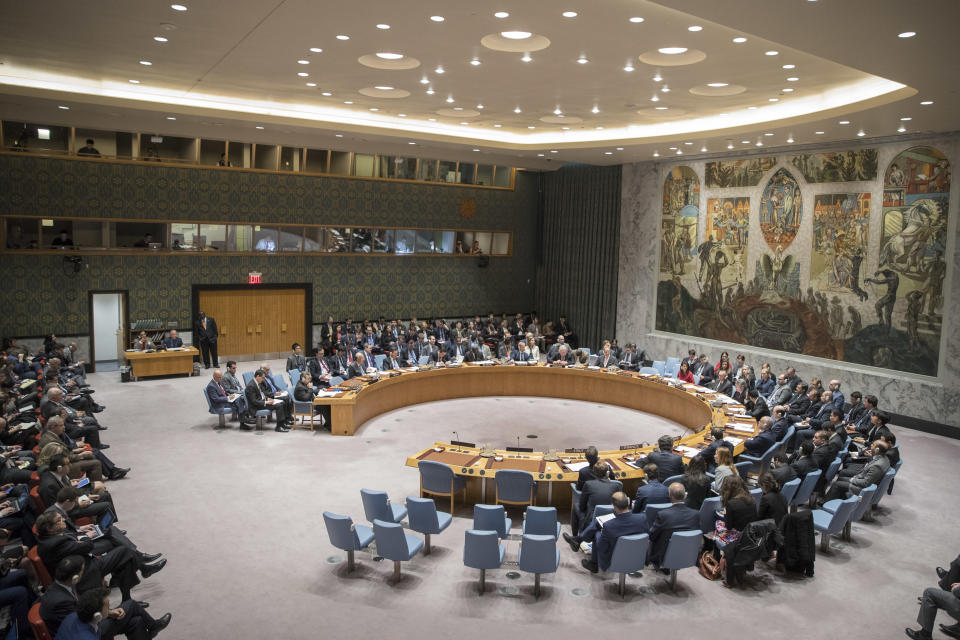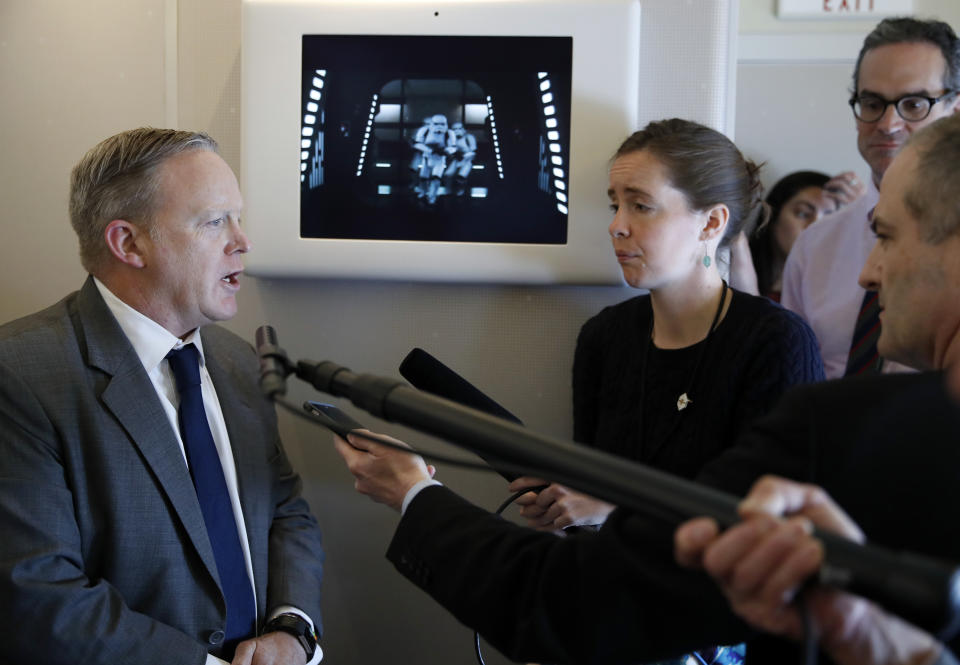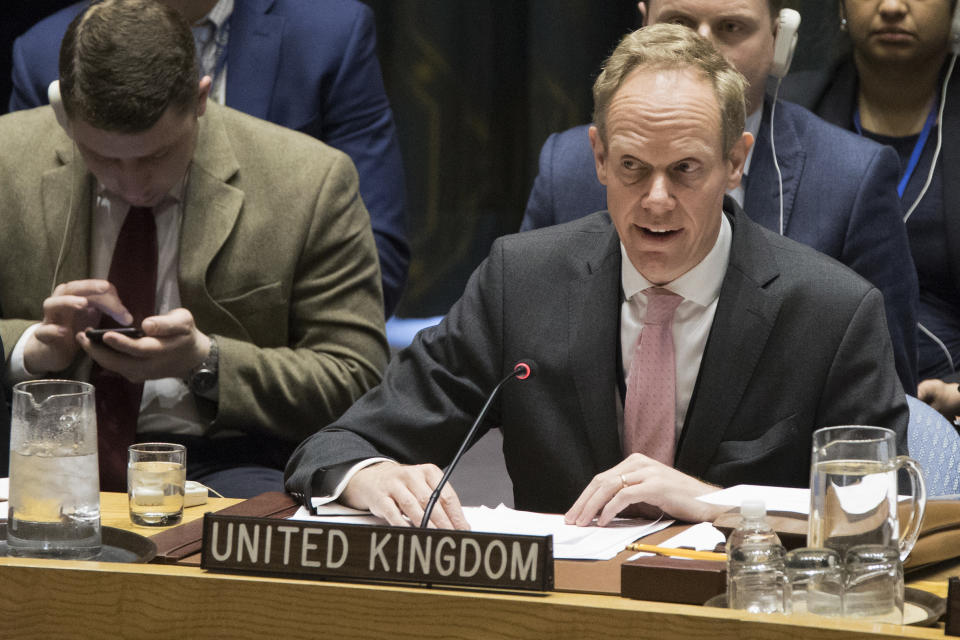The Latest: UN official calls for de-escalation in Syria
WASHINGTON (AP) — The Latest on events in Syria (all times EDT):
7:30 p.m.
The president of the United Nations General Assembly says the U.N. hopes there will be "no further escalation" following Thursday's missile strikes on Syrian targets by the United States.
Peter Thomson of Fiji says there are "peace processes underway" in Geneva and Astana, Kazakhstan. He says negotiators are "making progress and they're heading in the right direction," adding that "de-escalation and continuation of those peace processes" are preferred.
Thomson appeared Friday at the Woods Hole Oceanographic Institution in Massachusetts to discuss the upcoming Ocean Conference to be held at the U.N. in June.
Thomson opened his remarks by commenting briefly on the strikes, which were in response to this week's chemical attacks in Syria. Thomson said "people were just appalled by" the chemical attacks.
___
6:30 p.m.
Sweden's U.N. ambassador says the U.S. missile attack on a Syrian air base "raises questions of compatibility with international law."
Olof Skoog told an emergency meeting of the U.N. Security Council Friday that it's important that any action is based on international law.
The United States did not seek authorization from the Security Council or the U.S. Congress, and the missile strike was not based on self-defense.
Skoog says he hopes there is enough "common ground" for the Security Council to move forward on negotiating "a strong resolution on a robust and immediate investigation" into the suspected chemical weapons attack Tuesday on a town in in northern Syria, which killed 80 people. Thursday's missile strikes were in response to that attack.
___
4:45 p.m.
Secretary of State Rex Tillerson says Russia's response to the U.S. attack on Syria shows it continues to support Syrian President Bashar Assad.
Tillerson calls the reaction "very disappointing" but "not all that surprising."
The Kremlin has denounced Thursday's U.S. strike on a Syrian air base as an "act of aggression" against a sovereign state and a violation of international law.
President Donald Trump gave the go-ahead for the strikes in retaliation for this week's deadly chemical attack in Syria, which the U.S. believes was ordered by Assad.
Tillerson says Russia's reaction shows that nation's continued support for a regime that "carries out these types of horrendous attacks on their own people."
Tillerson briefed reporters after Trump concluded two days of meetings in Florida with China's president.
___
4 p.m.
Syria's deputy U.N. ambassador is calling Thursday's U.S. missile strikes against a Syrian air base a "barbaric, flagrant act of aggression" that will embolden "terrorist groups" to use chemical weapons in the future.
Mounzer Mounzer stressed at an emergency meeting of the U.N. Security Council Friday that the Syrian government doesn't possess chemical weapons and isn't responsible for Tuesday's attack on the town of Khan Sheikhoun. Syria maintains that an air strike hit a warehouse in the town where opposition forces stored chemicals.
Mounzer accuses the United States of justifying its air strikes "with empty pretexts" and "fabricated arguments."
Mounzer says the real aim of the U.S.-led coalition, which is in Syria ostensibly to go after extremist groups, is to weaken the Syrian government and its allies.
___
3:55 p.m.
Opposition activists say Syrian warplanes have taken off from the air base that was bombed by the U.S.
The Britain-based Syrian Observatory for Human Rights says two Sukhoi warplanes took off from the Shayrat air base in central Syria and attacked positions of the Islamic State group.
Osama Abu Zeid of the Homs Media Center says a number of warplanes took off from the Shayrat air base and landed in the nearby T4 air base. He says they did not carry out any attacks.
It was not immediately clear why the two gave different accounts of the events.
The Kremlin said earlier Friday that just 23 of 59 cruise missiles fired from American warships reached the air base, leaving the runway intact.
___
3:40 p.m.
Hillary Clinton says President Donald Trump's reasoning for ordering airstrikes against Syria conflicts with his attempt to ban Syrian refugees from entering the United States.
Speaking Friday in Houston, the former secretary of state says she hopes the Trump administration will follow Thursday's strike on a Syrian air base with a "broader strategy." Trump ordered the strike Thursday night in response to a deadly chemical attack U.S. officials have blamed on the Syrian military.
Clinton adds that the U.S. could not "in one breath speak of protecting Syrian babies and in the next, close America's doors to them."
A federal judge has stayed Trump's executive order to suspend admissions of immigrants from six Muslim-majority countries, including Syria, and halt the U.S. refugee program.
___
3:35 p.m.
China's U.N. ambassador never mentioned the suspected chemical weapons attack in Syria, or U.S. airstrikes, at an emergency meeting of the U.N. Security Council Friday.
Instead, Liu Jieyi focused on the need for a political solution to the six-year conflict.
China usually supports Russia, a close ally of Syria that accused the U.S. of aggression and violation of international law with Thursday night's missile strike.
But Liu steered clear of any criticism, referring obliquely to "some complicated new situations" in Syria in recent days which the international community must watch.
Liu says military means "will only worsen the suffering of the Syrian people."
___
3:30 p.m.
French President Francois Hollande (frahn-SWAH' oh-LAWND') has said the repeated use of chemical weapons in Syria "showed the urgent need for resolute action by the international community."
Hollande made the statement following an emergency defense meeting Friday evening after the U.S. cruise missile attack on a Syrian air base — a response to a deadly chemical attack.
Hollande says this week's events showed "the need to move forward simultaneously in the fight against (the Islamic State group) through an intensification of actions of the coalition."
Hollande repeated his wish for "political negotiation in Syria for a transition accepted by all."
___
3:25 p.m.
Venezuela's socialist government is condemning U.S. airstrikes in Syria as a violation of the Arab nation's sovereignty.
Venezuela is a close ally of Syria and Russia and points out the United Nations has not yet delivered its report on the chemical weapons attack this week in Syria that provoked the U.S. missile strikes.
In a statement, Venezuela's government says, "It's deeply worrisome that imperialist reasons are being used to justify military interventions that falsely attribute to the Syrian government the actions of extremists and terrorist groups."
___
2:55 p.m.
The U.N. political chief is urging the divided members of the U.N. Security Council to send a strong message after the chemical weapons attack in Syria "that any use of chemical weapons shall not be tolerated and will have consequences."
Jeffrey Feltman told an emergency council meeting Friday the council should unite on a resolution demanding an investigation of the attack that prompted U.S. airstrikes against the Assad government.
He says the international community has a responsibility to hold all perpetrators accountable "and that chemical weapons are never again used as an instrument of warfare."
Feltman says it's impossible to protect civilians in Syria as long as the government and opposition "are permitted to act with impunity."
___
2:35 p.m.
The U.S. ambassador to the United Nations warns the U.S. is prepared to take further action in Syria but hopes it will not be necessary.
Nikki Haley told an emergency meeting of the U.N. Security Council Friday that the United States couldn't wait following Tuesday's attack and "took a very measured step last night" with its airstrikes against the Assad government.
Haley says: "We are prepared to do more, but we hope that will not be necessary."
Looking ahead, she says, "It is time for all civilized nations to stop the horrors that are taking place in Syria and demand a political solution."
___
2:20 p.m.
The Pentagon says 59 cruise missiles hit their targets on a Syrian air base Thursday night.
Senior U.S. military officials say one missile failed.
Earlier, U.S. officials had said 58 missiles had struck their targets.
The officials weren't authorized to discuss the matter publicly and spoke on condition of anonymity.
—By Deb Riechmann.
___
2:15 p.m.
The U.S. ambassador to the United Nations says that while the Syrian government is responsible for Tuesday's chemical attack, Iran and Russia bear "heavy responsibility" for propping up and shielding President Bashar Assad.
Nikki Haley told the U.N. Security Council Friday that Russia is supposed to be a guarantor that all chemical weapons were removed from Syria under a 2013 agreement.
Haley says it could be that Russia knowingly allowed chemical weapons to remain, or that it was "incompetent" in their removal. She says: "Or it could be that the Assad regime is playing the Russians for fools, telling them that there are no chemical weapons, all the while stockpiling them on their bases."
Haley says: "The world is waiting for Russia to act responsibly in Syria."
___
1:30 p.m.
The White House says the U.S. response to suspected chemical attacks by the Syrian government was "justified and proportional."
Press Secretary Sean Spicer told reporters in Palm Beach, Florida, on Friday that the attacks on a Syrian air base late Thursday were the result of a "72-hour evolution."
Dozens of innocent people were killed in the suspected chemical attack Tuesday. Secretary of State Rex Tillerson said Thursday that the U.S. feels confident Syrian President Bashar Assad's government was behind the attack and that sarin gas was apparently used.
Spicer says Trump was offered a variety of options of a U.S. response from his Cabinet and members of his national security team. He gave the green light on the missile strike ahead of dinner with China's President Xi Jinping (shee jihn-peeng).
Spicer says Trump told Xi about the attack during their dinner Thursday night.
___
1:20 p.m.
Russia is calling on the United States "to immediately cease its aggression" and join efforts to bring peace to Syria and "work together to combat the terrorist threat."
Russia's deputy U.N. ambassador, Vladimir Safronkov, strongly criticized what he called the U.S. "flagrant violation of international law and an act of aggression" whose "consequences for regional and international security could be extremely serious."
He said Russia firmly stands by the Syrian government, calling it the main force against terrorism and saying it deserves the presumption of innocence in the chemical weapons attack.
But Safronkov offered a way ahead for the Trump administration — stop attacks, pursue a political settlement, and work jointly to combat "the terrorist threat."
___
12:40 p.m.
Senior military officials say the U.S. is looking into whether Russia participated in Syria's chemical weapons attack earlier this week.
The officials say Russia has failed to control the Syrian government's use of chemical weapons.
They say a drone belonging either to Russia or Syria was seen hovering over the site of the chemical weapons attack Tuesday after it happened. The drone returned late in the day as citizens were going to a nearby hospital for treatment. Shortly afterward, officials say the hospital was bombed.
The officials say they believe the hospital attack may have been an effort to cover up evidence of the attack.
The officials weren't authorized to speak publicly on the matter and demanded anonymity. They say they're still reviewing evidence.
—Lolita C. Baldor
___
12:30 p.m.
Britain's ambassador to the U.N. is stressing his country's strong support for the U.S. air strikes on Syria and harshly repudiating Russia for its protection of Syrian President Bashar Assad's regime.
Matthew Rycroft demanded that Russia "abandon its failed strategy," end its "protection of a war criminal," and join Western powers seeking to impose sanctions on Assad's regime.
He said, "Russia sits here today humiliated by its failure to bring to bear a puppet dictator entirely propped up by Russia."
Rycroft said Assad showed in the chemical weapons attack on the town of Khan Sheikhoun "that he is capable of redefining horror."
He said the United Kingdom will work in the U.N. Security Council to ensure that those responsible are brought to justice.
___
12:10 p.m.
Japanese Prime Minister Shinzo Abe (SHEEN-zoh AH-bay) says his government supports "the resolve of the U.S. government of never tolerating the proliferation and use of chemical weapons."
Abe is a close U.S. ally. He says chemical weapons have again taken the lives of many innocent people in Syria and the international community has been shocked by the tragedy.
In a statement issued Friday after the U.S. missile strike on Syria, Abe said Japan understands the U.S. action was intended to prevent "further worsening of the situation."
Abe added that the threat of weapons of mass destruction is becoming increasingly serious in East Asia as well — an apparent reference to North Korea, a neighbor of Japan. He said Japan praises Trump's commitment to "maintaining international order."
___
6:30 a.m.
Top European Union officials are supporting the U.S. missile strikes on military targets in Syria as a means of deterring further chemical weapons attacks by Damascus.
EU Council President Donald Tusk said in a tweet Friday that the "U.S. strikes show needed resolve against barbaric chemical attacks. EU will work with the US to end brutality in Syria."
European Commission President Jean-Claude Juncker said in a statement that he "understands efforts to deter further attacks."
He said "there is a clear distinction between air strikes on military targets and the use of chemical weapons against civilians."
___
6:00 a.m.
NATO's chief says Syrian President Bashar Assad only has himself to blame for a U.S. missile strike launched in retaliation for a chemical weapons attack in Syria that killed dozens of people.
NATO Secretary-General Jens Stoltenberg said Friday that "the Syrian regime bears the full responsibility for this development."
He said that the U.S.-led military alliance "has consistently condemned Syria's continued use of chemical weapons as a clear breach of international norms and agreements."
Stoltenberg said that "any use of chemical weapons is unacceptable, cannot go unanswered, and those responsible must be held accountable."







